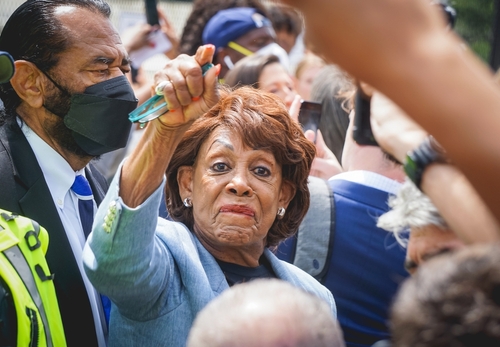
In another display of partisan theatrics, Congresswoman Maxine Waters recently found herself at the center of controversy during a hearing where she attempted to abruptly end the session without allowing all committee members to ask questions. This behavior underscores a broader issue with Waters' approach to leadership and her penchant for dismissing opposition voices.
Waters, often dubbed "Mad Maxine" by her critics, displayed her usual combative demeanor when Rep. Lance Gooden (R-TX) challenged her attempt to close the hearing prematurely. Despite his repeated requests for a "parliamentary inquiry," Waters reluctantly and sarcastically allowed Gooden his five minutes of questioning, highlighting her unwillingness to engage in fair and open discourse.
Watching Maxine Waters adjust that busted ass Temu hair helmet is funny as haaill 🤣 pic.twitter.com/NFbdKUwyd3
— It's 🇺🇸 Tiff 🇺🇸 (@TiffMoodNukes) July 10, 2024
This incident is not isolated. Waters has a history of inflammatory rhetoric and divisive behavior. Her recent claims on MSNBC about right-wing militias supposedly preparing for violence if Donald Trump loses the upcoming election were criticized as fearmongering and lacking substantial evidence. Waters' alarmist statements reflect a pattern of using exaggerated threats to distract from her own party's shortcomings and failures.
The irony is palpable when considering Waters' past remarks during the George Floyd protests. She infamously urged protesters to "get more confrontational" if then-officer Derek Chauvin was acquitted, a stance that arguably incited more violence rather than promoting peace. This double standard in condemning potential right-wing violence while excusing or even encouraging left-wing unrest is a glaring example of her hypocritical approach to political discourse.
Maxine Waters tried to overturn the 2016 election when she claimed President Trump stole it.
She told people not to accept the results & she instructed them to attack republicans at restaurants, grocery stores or wherever they are seen
Who agrees she should’ve been arrested?🙋♂️ pic.twitter.com/kNgUsonS4Y
— 👉M-Û-R-Č-H👈 (@TheEXECUTlONER_) July 10, 2024
Waters' recent actions also highlight her disregard for procedural norms and respect for her colleagues. Her abrupt attempt to end the hearing before all questions were addressed not only disrespects the committee process but also silences important voices in the discussion. This approach is symptomatic of a broader issue within the Democratic leadership, which often prioritizes partisan gains over genuine bipartisan dialogue.
Moreover, her behavior during the hearing and her continued use of divisive rhetoric suggest a disconnection from the pressing issues that truly matter to the American people. Instead of focusing on substantial policy debates or addressing critical concerns like economic recovery and national security, Waters and her allies seem more interested in political grandstanding and scoring cheap points against their opponents.
As Republicans prepare to take control of key committees, there is hope that a shift towards more constructive and inclusive governance will occur. Leaders like Patrick McHenry are set to bring a renewed focus on accountability and transparency, countering the opaque and often contentious style exhibited by Waters and her colleagues.
In conclusion, Maxine Waters' recent actions during the committee hearing and her continued use of alarmist rhetoric reflect a broader issue of partisan politics overshadowing substantive leadership. It is imperative for the health of our democracy that leaders prioritize unity, respect procedural norms, and engage in genuine dialogue to address the nation's challenges effectively.











One of the most despicable Black hags in the new Communist Party